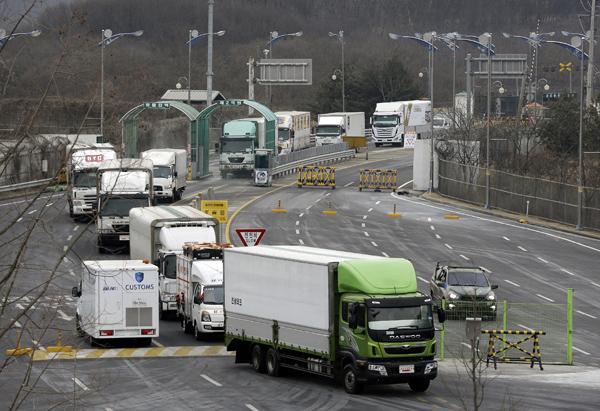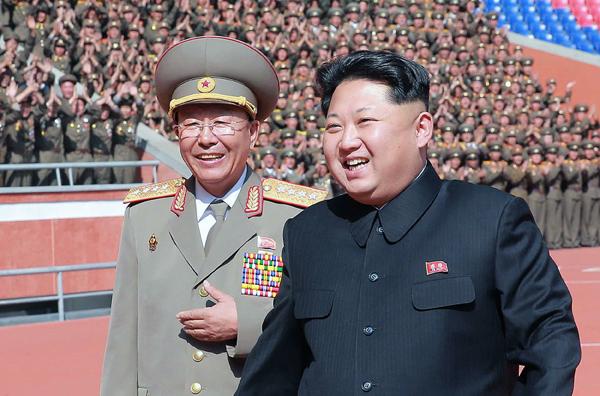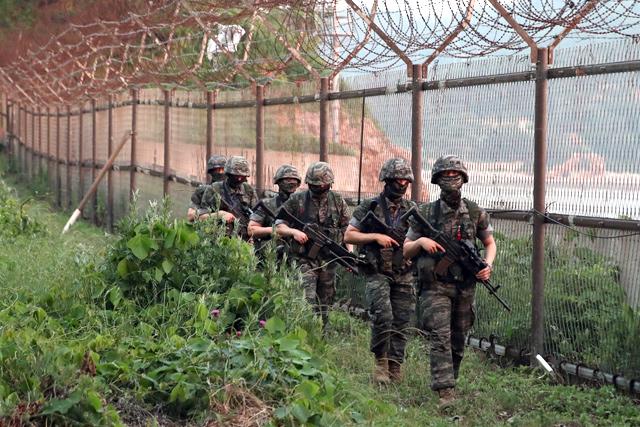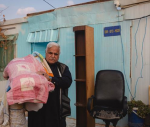You are here
North Korea expels all South Koreans from jointly run Kaesong industrial zone
By AFP - Feb 11,2016 - Last updated at Feb 11,2016

South Korean vehicles returning from North Korea’s joint Kaesong Industrial Complex pass the customs, immigration and quarantine office near the border village of Panmunjom in Paju, South Korea, on Thursday (AP photo)
SEOUL — North Korea on Thursday ordered the immediate expulsion of all South Koreans from the jointly run Kaesong industrial zone and the seizure of their factory assets in response to Seoul's decision to shut down the complex.
The measures mark a significant escalation of cross-border tensions that have been elevated since North Korea carried out a nuclear test last month and a long-range rocket launch on Sunday.
In a statement published by the official KCNA news agency, the Committee for the Peaceful Reunification of Korea (CPRK) said it was closing Kaesong and declaring it a military area.
It also announced that military hotlines with South Korea and the main communication channel through the border truce village of Panmunjom would be cut as soon as the expulsion of South Korean citizens had taken place.
It did not specify how long the links would be cut for.
"South Korean enemy forces will experience themselves the harsh and painful price they should pay for halting the Kaesong industrial complex," it said.
All South Koreans were ordered to leave Kaesong by 5:00pm Pyongyang time (0830 GMT) and told they could take nothing but their personal possessions.
'Seize all assets'
"We seize all assets of the South Korean companies and related organisations including machinery, raw materials and goods," the statement said.
The order to leave immediately was published on KCNA just 30 minutes before the expulsion deadline.
Seoul had announced on Wednesday it was closing down operations at Kaesong, which lies 10 kilometres inside North Korea, in protest over the North's nuclear test and rocket launch.
The owners of the 124 South Korean companies operating factories in Kaesong had sent hundreds of empty trucks into the North on Thursday morning to start loading up goods and equipment.
"We will make the utmost efforts to make sure that all our nationals return home safely," Seoul's unification ministry said in a statement.
Several people who crossed back into the South on Thursday morning said they had noticed an increased military presence in Kaesong, including armed soldiers carrying backpacks and sleeping bags.
Kim Soo-hee, a nurse working at a medical clinic in the complex, she had seen several military trucks arriving in Kaesong and a number of armed soldiers with backpacks and sleeping bags.
"There were more soldiers around the complex than usual," she said.
In September 2014, Pyongyang drafted a new operational regulation — rejected by Seoul — that would have allowed the North to detain South Korean businessmen in Kaesong in the event of an unresolved business dispute.
The CPRK statement did not specify what might happen to anyone failing to make the expulsion deadline.
Defending its decision to halt operations at Kaesong on Thursday, Seoul said North Korea had been using the hundreds of millions of dollars in hard-currency that it earned from Kaesong to fund its nuclear weapons and ballistic missile programmes.
Owners' anger
The government's move was slammed as "utterly incomprehensible" by the Kaesong company owners who said their businesses were being destroyed by politics.
Born out of the "sunshine" reconciliation policy of the late 1990s, Kaesong opened in 2004 and proved remarkably resilient, riding out repeated crises that ended every other facet of inter-Korean cooperation.
Earlier in the day, the United States also signalled unilateral moves against North Korea, with the US Senate unanimously adopting a bill expanding sanctions.
The United States and its main Asian allies, South Korea and Japan, have led a push for tough UN Security Council sanctions, but have met resistance from North Korea's main diplomatic protector China.
Although fiercely critical of Pyongyang's nuclear ambitions, Beijing is more concerned at the prospect of Kim's regime being pushed to collapse — triggering chaos on China's border.
The Senate bill would punish any person or entity importing goods, technology or training related to weapons of mass destruction, or engaging in human rights abuses.
Penalties would include the seizure of assets, visa bans and denial of government contracts.
It also aims to cut down on money laundering and narcotics trafficking — two major illicit activities believed to be funnelling millions of dollars into leader Kim Jong-un's inner circle.
Related Articles
SEOUL — South Korea on Wednesday announced the total shutdown of a jointly run industrial park in North Korea, saying Pyongyang had been usi
SEOUL — North Korea blew up an inter-Korean liaison office on its side of the border on Tuesday, after days of increasingly virulent rhetori
SEOUL — North Korea fired multiple cruise missiles off its west coast on Saturday, Seoul's military said, the latest in a string of recent P



















